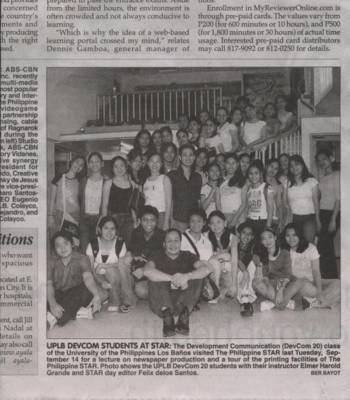yep, its been a long time since i last updated, save for the pictures, the new layout and the article about my major.
(my hands are freezing, its soooo coooold in here) im up here at Abode, an internet cafe - is that the right term?- in the up campus, well near the gate that is.
i've only had 3 hours of sleep, i'm hungry and i have ballroom class in an hour.
the semester is just starting and i already feel as if the work is as high as my knees.
i guess its because of the subjects i'm taking this sem - well as compared to last sem, which was alot lighter in load (15 units) an whoohoo! lucky me, i computed my average to be 1.45 (those who dont understand, in UP 1 is the highest grade and 5 is the failing grade, 3 is passing) and is in the US (university scholar better known as chancellor list). but i'm not yet sure, i havent really seen my name on the list.
my subjects this sem are :
2 major subjects: DEVC 134 and 140 (ok people, remember this when you read my blog: DEVC stands for development communication, which is my course and college, ok?) 134 is about telecommuications - which i'm actually doing an assignment for while writing this- and 140 is basic photography! whoohoo! i'm really exited about this subject! i really want to learn how to take good pictures! and hopefully by the end of the sem i will post some of my exercises here if i can. the thing is DEVC 140 takes alot of time and effort (matrabaho ang subject na ito, kaya kailangan magsikap kumuha ng magandang ... photograph).
i also have 1 technical course: ZOO 1 (general zoology), and yes i'm going to disect a toad- very much different than what we had in 2nd yr HS! seems interesting enough to me as trivia on radio shows. funny thing is my professor is my uncle, but doesnt guarantee that ill pass though, have to work hard for it. memorizing animal parts is just not my forte. (ah! why did i take sci com in the first place?!
i've got a social science elective this sem , the only one out of the 3 electives us sci com majors get to choose - the other 2 were already picked for us, kailangan daw namin - and i think to myself, why in the world did i pick POSC 112?! its the Politics of Development, that's why i think i need it to become a better development communicator. but, presently, my dreams of woring for the UNDP and others like are crumbling...
first day, i wanted to smack myself for not reading up on my DEVC 10 notes, now i'm drowning in the book Development as Freedom by Amartya Sen - its our first reference , we have to read the whole book and there are 4 others next in line, Sen's thought is good though, but it is so abstract - i'm having trouble understanding his non-techniocal literature, but that's just me.
yes, the subject that kept me up, but thats mostly my fault because i didnt read the chapter i was assigned to at once - as i said, i'm having a difficult time- and i was supposed to report on it this morning, lucky me the dicussion took long. but i was ready - stayed up till 5 to take notes on it and had a lot of help from my systems analyst father -thanks dad :). the extension gives me more time to really understand what i'm going to report next tuesday.
in a class of 19, i'm the only sophomore among juniors and seniors, and foreigners - this means no offense, because its not the point- (thinks again why she took that subject in the first place) i dunno, i feel... intimidated. puts pressure on me, for example i'm the first one to report-being 1st in the class list (see why i'm so desperate to give a good report). in class, i feel... ignorant. i just listen to the intelligent discussions, agree, sometimes dont, but i cant seem to make an intelligent comment or join the discussion. though it is ok to give stupid answers or ask stupid questions, because it is all part of learning. and believe me i am interested , that is why i took the subject, i want to learn, but (i guess id rather like to listen to their view points than mess the discussion up with my comments). i guess i've dropped my oppinions for politics since...i dont remember. this is a perfect exercise for me, well thats how i should look at it.
(thinks how elaine and april are doing-both are political science majors)
ive got 2 GE (the subjects everyone takes) courses: ENG 2 (college writing) which is a paper factory -you get what i mean- so that means alot of time to thinking of first paragraphs and research, and the other is NASC5 (environmental biology) which seems alright....
its obvious that i'm rushing, i have a clas in 30 minutes- oh yes PE- and i still have to go home and change into a skirt and sandals.
so thats my rantings for today....
why cant i find anything on my assignment....?

